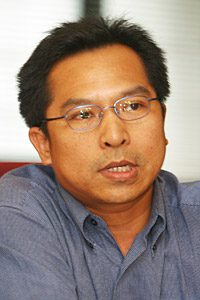
Thailand is holding its breath awaiting the European Union's (EU) re-assessment of the country's notorious fishing industry.
As the world's fourth-largest seafood exporter, Thailand earns annual revenue of over US$6.5 billion (233 billion baht) from its fishing business. But in recent years, the country's distant water fishing has been under the spotlight after a stream of reports exposed shocking human rights abuses linked to the supply chains of major global seafood producers. Despite recent reforms to Thailand's anti-trafficking laws that came late last year, and the introduction of a vessel tracking system to curb illegal, unreported and unregulated fishing (IUU) along with human rights abuses on ships in remote, unpoliced waters continue.
In over to avoid crackdowns in Indonesia and Papua New Guinea, rogue Thai fishing vessels have shifted to operate in the environmentally fragile Saya de Malha Bank off the coast of East Africa in the Indian Ocean since late last year, according to a new report by Greenpeace Southeast Asia which tracked fleet movements between 2014 and 2016. In this area, these Thai fleets continue to fish and transship catches at sea without authorisation, deploy catastrophically unsustainable fishing methods, and crew vessels with victims of trafficking and forced labour in deplorable working conditions.
Of the 15 survivors interviewed by Greenpeace, half of them experienced physical abuses while working on board the vessels. They were kicked or hit by ship captains. In some cases, the abusers used weapons like wooden bats and knife-sharpening stones to beat them. One of the main reasons for beatings was illness, especially when there was insufficient food on board and exhausted crew members would sneak off to rest.
Poor nutrition, coupled with extreme physical labour, led to reported outbreaks of Beriberi disease, with six reported fatalities. At the heart of this tragedy lies a complex web of ownership structures within the Thai distant water fishing and seafood processing sectors.
In migrating to the Saya de Malha Bank, the Thai fleets have shifted to an ecologically rich and sensitive area essentially devoid of effective management and controls on bottom fishing.
Transshipment at sea is central to the current Thai business model, and maintaining fishing fleets in the distant Saya de Malha Bank requires routine journeys by reefer of over 7,000km to deliver supplies (and sometimes trafficked workers) and pick up fish, that has been reported to include a 50% by-catch of sharks. Transshipments at sea also make it possible for fishing vessels to stay out in the ocean indefinitely, out of sight and out of reach of enforcement.
Greenpeace investigations into nefarious activities aboard fishing vessels operating in the Saya de Malha Bank revealed that trafficking, exploitation, abuse, negligence and IUU fishing have remained central to the operations of some Thai overseas fishing companies. With the return of reefer-assisted Thai overseas fishing, it is arguably only a matter of time before dirty and scandalous business models are exported again elsewhere.
Seafood from the Saya de Malha Bank has continued to flow into the supply chains of major Thai companies producing for global export markets. The entry of seafood tainted by human rights abuses and IUU fishing into the supply chains of companies -- including major global brands -- that distribute products around the world, highlights the need for stronger traceability systems and greater transparency in procurement practices.
With the yellow card status given by the European Union, still haunting Thailand, and an inspection under way, the government cannot afford to lose face again. It needs to come up with a resolution to monitor and keep its rebellious fishing industry in check, and turn the tide to eradicate destructive and exploitative fishing for good.
Inspections are an integral part of Thailand's ongoing efforts to tackle human rights abuses and IUU fishing. But to weed out the bad operators, the government should improve inspection frameworks and intelligence-sharing efforts with other countries and civil society.
In the case of the fleets at the Saya de Malha Bank, Thailand's temporary controls on overseas transshipment at sea are far from enough. These controls should be permanent, with additional scrutiny applied to transshipments at sea, and policies that move towards eliminating the practice altogether. The government must meanwhile fulfil its responsibilities as a flag state and ensure that appropriate management and conservation measures are in place and applied to fishing operators in the Saya de Malha Bank.
With increasing dependence on migrant workers at home, and negative press about human rights violations by international watchdogs, Thailand needs policies that ensure foreign workers are always treated with dignity. Such safeguards are necessary to protect workers on board fishing vessels.
Producers, buyers, industry associations and consumers have the power to squeeze the tainted fish out of the market. Responsibility ultimately, however, rests with the industry. The fact that fish caught by exhausted men (potentially victims of forced labour) dying of archaic diseases still have a high chance of entering some of the globe's best-known cat food brands underscores the need for improved traceability systems.
Thailand is entering a new chapter as a nation. It is on the threshold of making real progress toward the elimination of dirty fishing and human rights abuses from its seafood supply chains. But, without sustained scrutiny, resolute controls, and true accountability within the Thai overseas fishing sector, hard-won reform risks sliding into irrelevance. Private, public and third sector stakeholders, both inside and outside of Thailand, all have a responsibility to work together to ensure only sustainably and ethically produced Thai seafood reaches shelves, freezers, sushi bars and cat bowls around the world.
